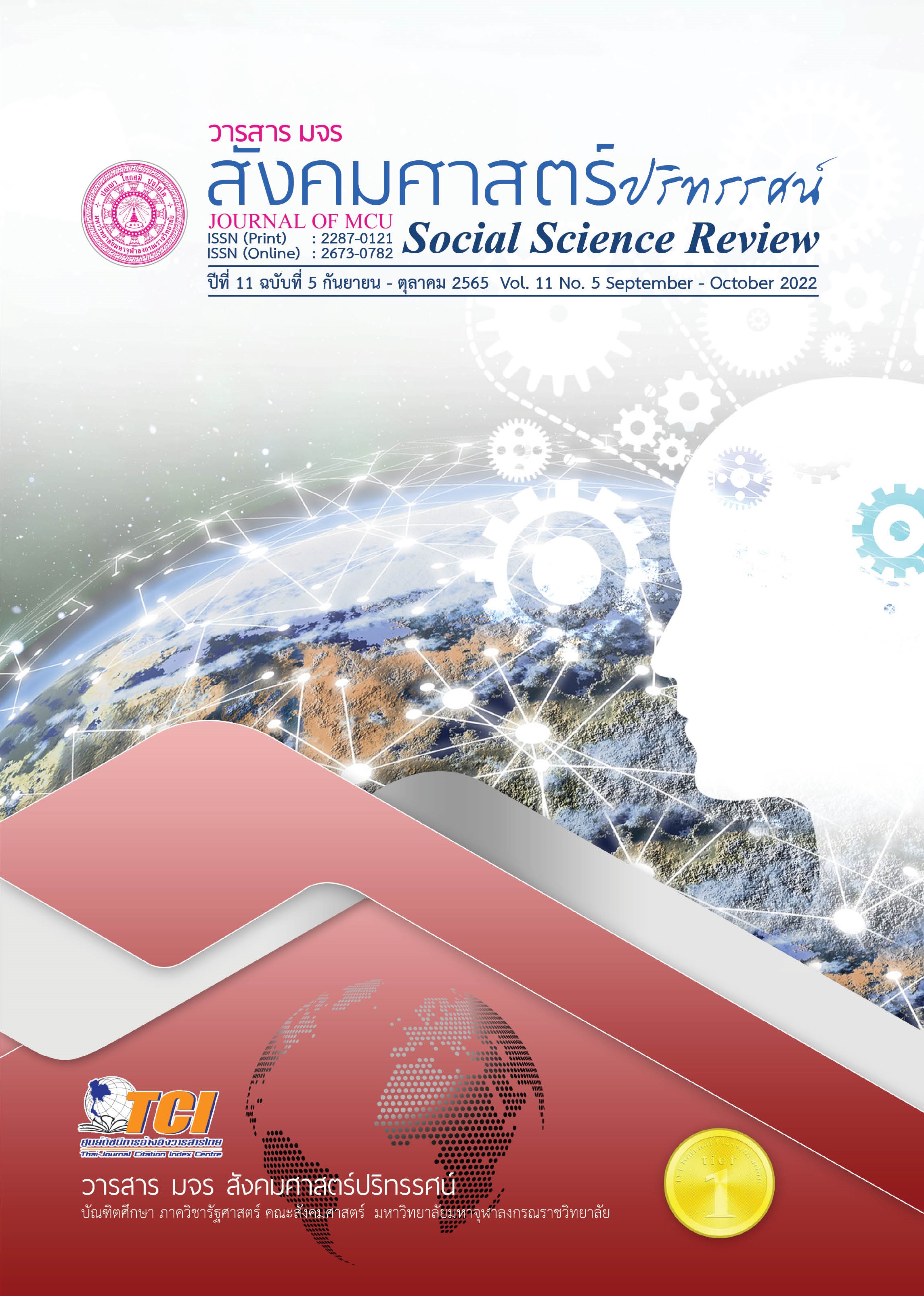การประยุกต์วิธีคิดตามหลักโยนิโสมนสิการกับ การตัดสินใจเข้าร่วมชุมนุมทางการเมือง
คำสำคัญ:
หลักโยนิโสมนสิการ, การตัดสินใจทางการเมือง, การชุมนุมทางการเมืองบทคัดย่อ
บทความนี้มีวัตถุประสงค์เพื่อศึกษาวิธีคิดตามหลักโยนิโสมนสิการเพื่อให้สามารถนำมาประยุกต์ใช้ในการตัดสินใจเข้าร่วมชุมนุมทางการเมือง การชุมนุมทางการเมืองเป็นการแสดงออกของการมีส่วนร่วมทางการเมืองรูปแบบหนึ่งเพื่อต้องการเรียกร้องหรือเสนอข้อคิดเห็นต่อการบริหารงานของรัฐบาลให้เป็นไปตามที่ต้องการ โดยการที่จะตัดสินใจเข้าร่วมชุมนุมทางการเมืองกับฝ่ายใดก็ตามถือว่าจำเป็นอย่างยิ่งที่จะต้องมีการพิจารณาอย่างรอบคอบถึงผลลัพธ์ที่จะได้มาตรงกับวัตถุประสงค์ที่ต้องการหรือไม่ หลักโยนิโสมนสิการจึงเป็นหลักธรรมที่มีวิธีการทางความคิดที่เป็นระบบให้สามารถวิเคราะห์เพื่อให้เห็นเหตุและผลของการกระทำรวมถึงเป้าหมายให้ได้ประจักษ์อย่างแท้จริง มีหลักวิธีคิดคือ วิธีคิดแบบอรรถธรรมสัมพันธ์สามารถทำให้ทราบถึงจุดประสงค์และความมุ่งหมายของกิจกรรมนั้นว่าต้องสร้างประโยชน์ให้แก่ส่วนรวมมากน้อยเพียงใด วิธีคิดแบบคุณโทษและทางออกจะต้องมองเห็นทั้งด้านดี ด้านเสีย และการแก้ปัญหาที่ตรงกับสาเหตุ และวิธีคิดแบบอุบายปลุกเร้าคุณธรรมช่วยให้การพิจารณาตัดสินใจการเข้าร่วมชุมนุมทางการเมืองเป็นไปโดยการใช้สติ การใช้วิธีคิดตามหลักโยนิโสมนสิการเข้ามาประยุกต์ใช้ประกอบตัดสินใจในเข้าร่วมชุมนุมทางการเมืองจะช่วยให้มีการพิจารณา วิเคราะห์ แยกแยะ ข้อมูลต่าง ๆ ได้ดี อันจะส่งผลถึงการ นำไปสู่การตัดสินใจเข้าร่วมชุมนุมทางการเมืองที่เป็นไปอย่างมีคุณค่าและเกิดประโยชน์แก่ประเทศชาติโดยแท้จริง
เอกสารอ้างอิง
จันทนา สุทธิจารี. (2544). การมีส่วนร่วมของประชาชนในการเมืองการปกครองไทยตามรัฐธรรมนูญฉบับประชาชน. กรุงเทพฯ: โรงพิมพ์ วี.เจ พริ้นติ้ง.
พระพุทธโฆษาจารย์ (ป.อ. ปยุตฺโต). (2562). พุทธธรรม ฉบับปรับขยาย (พิมพ์ครั้งที่ 53).กรุงเทพฯ: มหาวิทยาลัยเอเชียอาคเนย์.
มหาจุฬาลงกรณราชวิทยาลัย. (2560). พระไตรปิฎกฉบับภาษาไทย ฉบับมหาจุฬาลงกรณราชวิทยาลัย. กรุงเทพฯ: โรงพิมพ์มหาจุฬาลงกรณราชวิทยาลัย.
มานิตย์ จุมปา. (2543). รัฐธรรมนูญแห่งราชอาณาจักรไทย พุทธศักราช 2540 (ความรู้เบื้องต้น).กรุงเทพฯ: สำนักพิมพ์นิติธรรม.
ยรรยง ผิวผ่อง และศุภวัฒนากร วงศ์ธนวสุ. (2558). การจัดการชุมนุมทางการเมือง. วารสารภาษา ศาสนา และวัฒนธรรม, 4(2), 218-234.
ลิขิต ธีรเวคิน. (2540). วิวัฒนาการเมืองการปกครองไทย (พิมพ์ครั้งที่ 5). กรุงเทพฯ: สำนักพิมพ์มหาวิทยาลัยธรรมศาสตร์.
ศักดิ์สิน อุดมวิทยไพศาล. (2562). กรอบแนวคิดเชิงทฤษฎีพฤติกรรมทางการเมืองของประชาชน. วารสารมนุษยศาสตร์และสังคมศาสตร์ มหาวิทยาลัยราชภัฏอุบลราชธานี, 10(1), 301-302.
สมบัติ ธำรงธัญวงศ์. (2544). การเมือง: แนวความคิดและการพัฒนา. กรุงเทพฯ: สำนักพิมพ์เสมาธรรม.
Choma, B., & Hafer, C. (2009). Understanding the relation between explicitly andimplicitly measured political orientation: The moderating role of political sophistication. Personality and Individual Differences, 47(8), 964-967.
Dalton, R. (2000). Citizen attitudes and political behavior. Comparative Political Studies, 33(6-7), 912-940.
Ondercin & Jones-White. (2011). Gender Jeopardy: What is the Impact of Gender Differences in Political Knowledge on Political Participation?. Social Science Quarterly, 92(3), 675-694.
ดาวน์โหลด
เผยแพร่แล้ว
รูปแบบการอ้างอิง
ฉบับ
ประเภทบทความ
สัญญาอนุญาต
ลิขสิทธิ์ (c) 2022 วารสาร มจร สังคมศาสตร์ปริทรรศน์

อนุญาตภายใต้เงื่อนไข Creative Commons Attribution-NonCommercial-NoDerivatives 4.0 International License.
เพื่อให้เป็นไปตามกฎหมายลิขสิทธิ์ ผู้นิพนธ์ทุกท่านต้องลงลายมือชื่อในแบบฟอร์มใบมอบลิขสิทธิ์บทความให้แก่วารสารฯ พร้อมกับบทความต้นฉบับที่ได้แก้ไขครั้งสุดท้าย นอกจากนี้ ผู้นิพนธ์ทุกท่านต้องยืนยันว่าบทความต้นฉบับที่ส่งมาตีพิมพ์นั้น ได้ส่งมาตีพิมพ์เฉพาะในวารสาร มจร สังคมศาสตร์ปริทรรศน์ เพียงแห่งเดียวเท่านั้น หากมีการใช้ภาพหรือตารางหรือเนื้อหาอื่นๆ ของผู้นิพนธ์อื่นที่ปรากฏในสิ่งตีพิมพ์อื่นมาแล้ว ผู้นิพนธ์ต้องขออนุญาตเจ้าของลิขสิทธิ์ก่อน พร้อมทั้งแสดงหนังสือที่ได้รับการยินยอมต่อบรรณาธิการ ก่อนที่บทความจะได้รับการตีพิมพ์ หากไม่เป็นไปตามข้อกำหนดเบื้องต้น ทางวารสารจะถอดบทความของท่านออกโดยไม่มีข้อยกเว้นใดๆ ทั้งสิ้น





